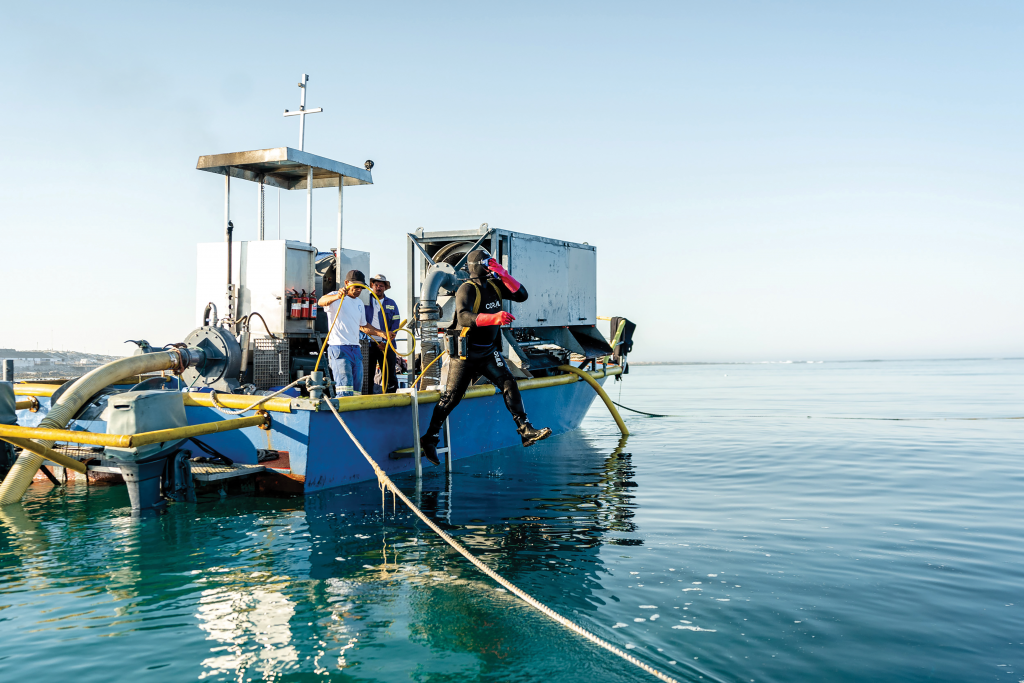
In Conversation with a Diamond Diver
For Lino, diamond diving is in his blood. He grew up in the Northern Cape, close to the heart of the industry in Port Nolloth. He started to pursue a career in diamond diving straight out of high school. His first job was in Hondeklip Bay, a coastal village in the Namakwaland district, followed by a short stint as a diamond diver in the Chikapa River in Angola. After this, he settled into his ocean diving career working on the South African coastline from Port Nolloth up to the Namibian border. Now retired from the industry, Lino speaks fondly of the freedom and the job satisfaction, describing it as some of the best times of his life. Here he speaks to Ocean Diamonds about his experiences of being a diamond diver.

How would you describe ‘a day in the life’ of a diamond diver?
A typical day will start with the boat owner picking up divers and crew from about 3 o’clock in the morning. Every one will go to the harbour where you bring your vessel alongside the jetty to load your food and spares. After this, you leave the harbour and sail off to your work site. It can take up to 5 hours depending on where you work. When you get to the site and the vessel is anchored, one diver will start prospecting (searching for gravel in catchment areas). If he finds a good place, we will deploy more anchors to secure the vessel using a smaller tender boat that we tow behind us for this purpose. Once the vessel is secure we will ride our hoses in with our tender boat and sink them on our marked location. Two divers will enter the water, prime the pump & begin; this will carry on for the whole day.
How long would you typically stay in the water?
The length of a divers shift underwater is determined by the water depth. It can be anything from 30 minutes to 4 hours if it is really shallow. We would work until the vessel has enough gravel or the weather deteriorates.

What kind of challenges might you face on the job?
The immediate environmental challenges on site would be rough seas, bad visibility, too much sand and heavy boulders to move before you get to good material.
Can you describe a memorable moment at sea?
I had so many memorable days diving but the days when we knew we had found good diamonds and also the prospect of a good few sea days in a row do stand out.

What do you find inspiring about diamond diving?
The whole diamond diving process for me personally was special. The idea that the diver is the first person to come into contact with the diamonds in millions of years is amazing! That and being surrounded by raw nature are the things that make it very special for me.
Can you tell us more about what it is like on a diving boat?
These vessels are purpose built and physically there is simply no room for luxury so it is a harsh environment in the way of comfort. Despite the limited space, on all the boats I have ever worked on, the social environment was always a very happy place. This is because it’s always a very small operation with no more than 4 or 5 divers per vessel so everyone gets to know each other personally and become good friends as well as colleagues.
And what about the community off the boat, can you tell us what it is like living on land together?
We lived in very small communities made up of people from all walks of life trying to make a living in the industry. Everyone knew each other. When we weren’t working, we would fish, surf and camp. Or just have some drinks together and blow off some steam!
Any final thoughts?
The things I have learnt and the people I have met in the industry are priceless. It changed my life and I am part of it.

The idea that the diver is the first person to come into contact with the diamonds in millions of years is amazing!